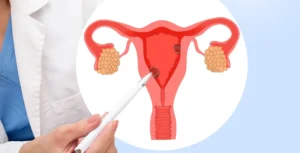Uterine Cancer or Endometrial Cancer
In a woman’s reproductive system, uterine cancer is the most common cancer. When healthy cells in the uterus change and develop out of control, a tumour forms. A Tumor can be A tumour might be malignant or non-cancerous. A malignant tumour can develop and spread throughout the body. A benign tumour can develop, but it won’t usually spread to other organs. 
Two Major Types of Uterine Cancer:
Adenocarcinoma: This cancer type accounts for more than 80% of all uterine cancers. It is derived from endometrial cells. Endometrioid carcinoma is a kind of endometrial adenocarcinoma that is treated differently based on the tumor’s stage, how far it has spread into the uterus, and the stage or extent of the illness (see Stages and Grades). Endometrial serous carcinoma is a less prevalent kind. This type of cancer is treated similarly to ovarian cancer.
Sarcoma: This form of uterine cancer occurs in the uterine glands’ supporting tissues or the myometrium, or uterine muscle. Sarcoma contributes for around 2% to 4% of all uterine cancers. Sarcomas are often handled differently than adenocarcinomas. Leiomyosarcoma and endometrial stromal sarcoma are two types of endometrial sarcoma.
Abnormal vaginal bleeding is the most common sign of endometrial cancer, and it can vary from a watery, blood-streaked flow to a flow that contains more blood. Vaginal bleeding can be a sign of a problem during or after menopause.
What are the Symptoms of Uterine Cancer?
- New start of severe menstrual cycles or bleeding between
- Vaginal bleeding or spotting after menopause
- Consistent discomfort in the lower abdomen or pelvic region for two weeks or more
- Vaginal discharge that is pink or white in color
Cancer or other health concerns may be the source of these symptoms. If a woman is experiencing any of these symptoms, she should visit her doctor immediately.
How is Uterine Cancer Diagnosed?
A pelvic exam, including a rectovaginal exam, as well as a general examination should be conducted when a woman encounters troubling symptoms. If the test results are abnormal, the woman should have an endometrial biopsy, ultrasound, and/or a D&C operation.
What are the treatment options for Uterine Cancer?
Surgery is generally used to treat uterine cancer. The uterine tube and ovary, as well as pelvic lymph nodes, are removed during surgery. This can be accomplished by an open, laparoscopic, or robotic procedure.
Several factors will influence your treatment program, including:
- The size and location of your cancer
- Your age and overall health
- The stage, grade, and exact subtype (histology) of your cancer
Why is it important to consult an Uterine Cancer Specialist in Delhi NCR?
Delhi is one of the best cities in India for the treatment of gynaecological cancer, with great availability of surgical specialists and infrastructure for the treatment of this complex disease. The treatment for uterine cancer requires significant expertise and a strong team. Being the best uterine Cancer specialist in Delhi Dr. Usha M Kumar offers the best treatment for uterine cancer and diagnosis in Delhi. For more details, contact us!

